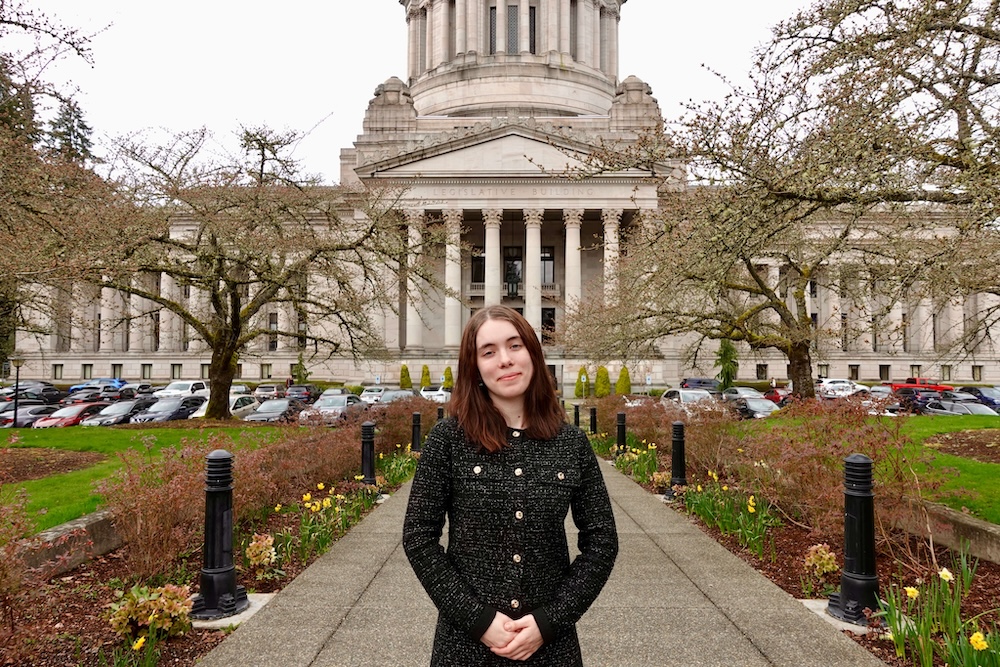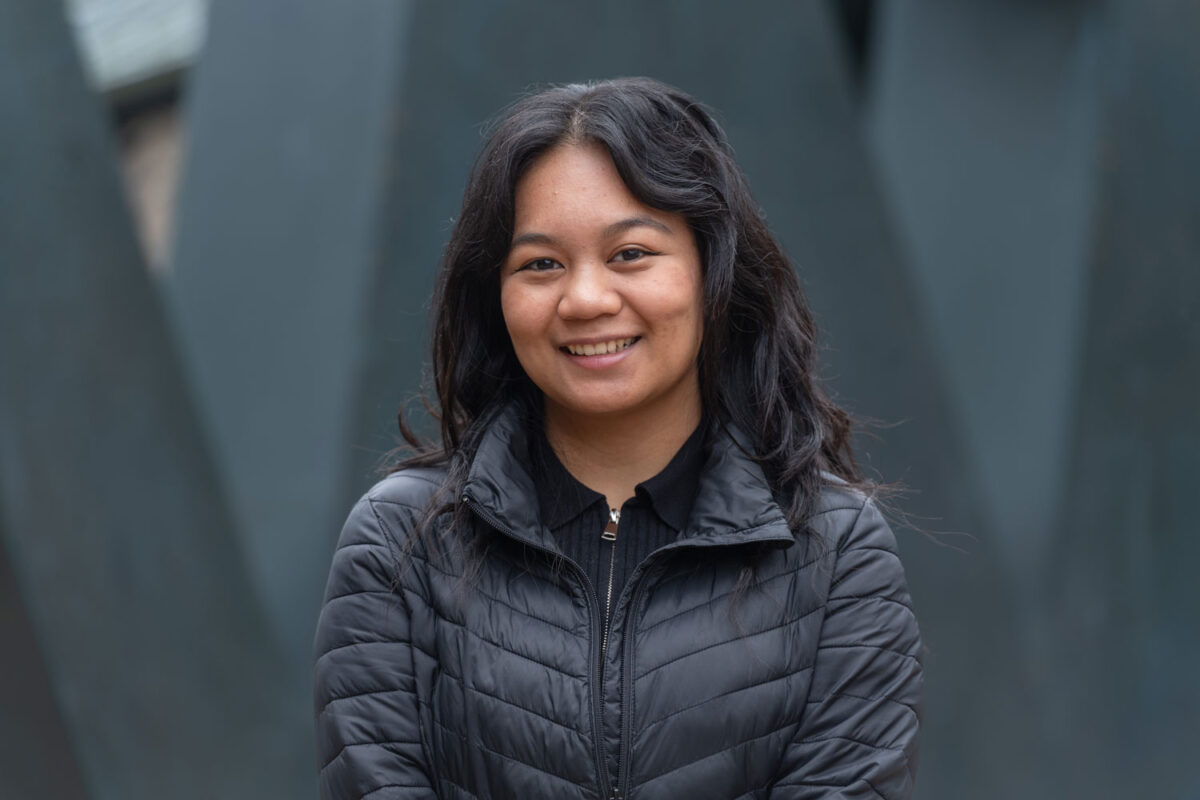The fictional trial of Tony Grubb began on March 8, 2022.
Charged with one count of burglary with assault or battery and one count of grand theft, Grubb’s defense team — five students from the University of Washington Bothell — spent months preparing for the big day. Using case packets designed for law school students, they gathered facts, reviewed written testimonies and prepared witnesses to prove his innocence.
Allegedly, Grubb — played by first-year student Emran Ahmed — broke into a condominium owned by 78-year-old Elise Stevens and forced her at gunpoint to assist him in locating various valuable items in the home before fleeing with them. Grubb, however, maintains his innocence and says that he has been misidentified and that the crimes were actually committed by Virgil “Ace” Hodges.
His fate lay in the hands of the students in Gavin Doyle’s Discovery Core Experience class, The Legal Case: Making Evidence Persuasive. Five students defended him, five prosecuted him, and members of the University’s Law Society served as judges — tasked with the burden of deciphering who was telling the truth.
The defense
The opening statement for the defense, addressed to a jury of peers and a Law Society judge, was presented by first-year student Leonille Matunan. Dressed in courtroom apparel, he contended that this case was not about robbery. It was about mistaken identity.
“Have you ever been accused of something you didn’t do?” Matunan asked, pressing the jury. “If you’re being honest with yourself, the answer is yes. We all have. Imagine, then, that you end up sitting where Grubb is — completely innocent, your life hanging in the balance.”
Matunan was successful in getting the jury to resonate with misplaced blame, but it was harder to get them to resonate with all the facts. For starters, Grubb’s girlfriend was found wearing one the stolen necklaces, his fingerprints were found on one of the candy bars inside the victim’s home, and he generally fit the description of the attacker, although the victim has poor vision.
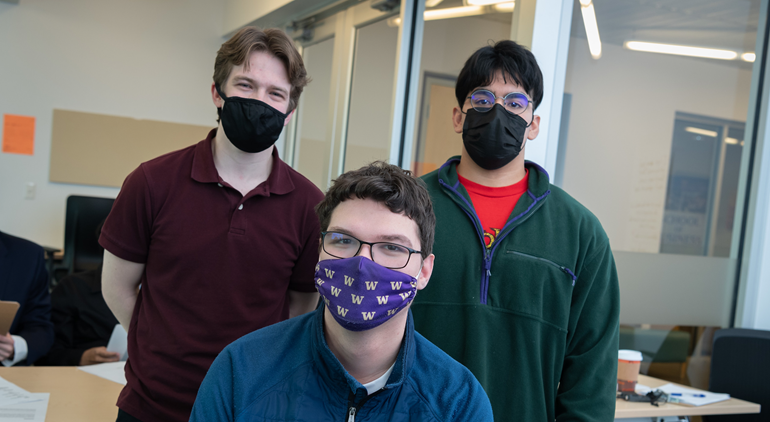
Thankfully for Grubb, the defense had an explanation for all of this. They argued that he won the necklace in a bet and that his fingerprints were found on the candy bar packaging because he worked at the convenience store where the candy bar was purchased. They pointed the finger instead at Ace Hodges, who better fit the victim’s description of the attacker and was known to have visited the building where the victim lived. Suspiciously, he has since fled town, and the police have yet to follow up.
Exclusive insights
To make Grubb’s defense more challenging, his legal team had no prior experience in law, and for some members, it was their first quarter on a college campus. In an exclusive sit-down interview with UW Bothell News, Matunan shared his experience — and strategy.
“A lot went into this trial. It required us to learn public speaking skills, the workings of our legal system, how to collaborate with group members and effectively communicate an argument,” he said. “My team and I went back and forth on the best way to defend Tony Grubb. In the end, we decided we wanted to humanize him. He is a father figure; he loves his girlfriend’s kids and would never want to jeopardize his future with them. Coming to that decision required a lot of critical thinking, communication and compromise.”
That is precisely why Doyle says The Legal Case is such a great DCX class. He said that to him, “A Discovery Core class gets students engaged and connected. I didn’t want to just give students information — I wanted them to do something with it,” he said, “because I think that is the heart of what it means to be a college student.”
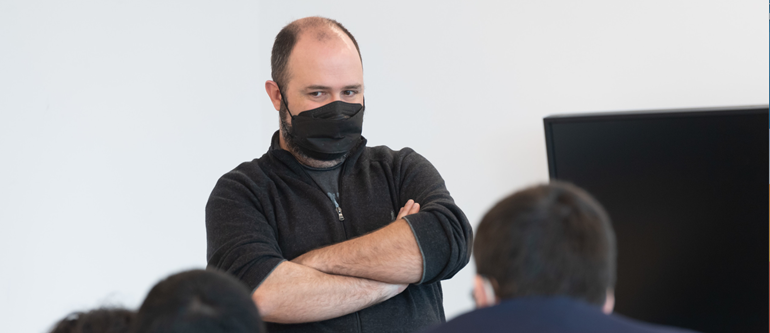
To prepare for the trial, which doubles as their final, students spent the quarter learning about criminal, civil and evidence law in addition to identifying and objecting to improper questions and testimony — such as the ever-tricky hearsay — at trials. Then, they got to work building their case by writing direct and cross examinations as well as opening statements and closing arguments. “It was a lot of work, but it’s been rewarding,” Matunan said. “It’s definitely not like any class I have ever taken before.”
The prosecution
The prosecution, meanwhile, painted Grubb in a much different light. They were confident it would be enough to get the conviction. First-year student Jordan Cheng delivered the team’s opening statement, asserting that “standing up for justice is what brought me here today.”
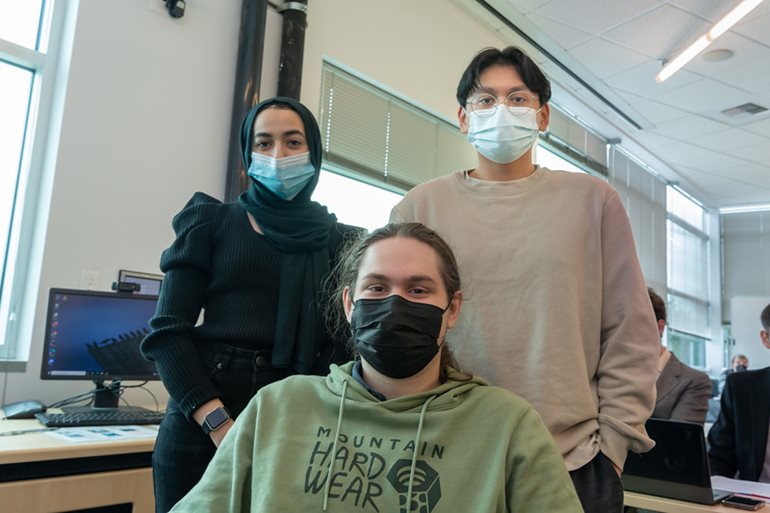
Cheng exposed to the judge and jury that Grubb had a prior burglary conviction, one that took place at the same condo complex where the victim lived. “He is motivated by a desire for money, and Ms. Stevens was an easy target because she is elderly and lives alone.
“We hope that Tony would be brought to justice and receive the punishment he deserves,” Cheng said. “It’s evident that he has not changed into a better person.”
The prosecution pointed to the defendant’s fingerprints at the scene of the crime, a flashlight found that resembles one that Grubb’s girlfriend confessed went missing, and of course, the stolen necklace that was worn by his girlfriend. “The evidence against him is damning,” said Cheng.
But was it enough to get a conviction?
The verdict
Presiding over the case was judge Misheel Ildbaatar, a sophomore in Law, Economics & Public Policy and a member of the Law Society. Although the decision was up to the jury, Ildbaatar said she believed Grubb should be found not guilty. “There is a lot of evidence against him, but I don’t think there is enough to be sure beyond any reasonable doubt,” she said.
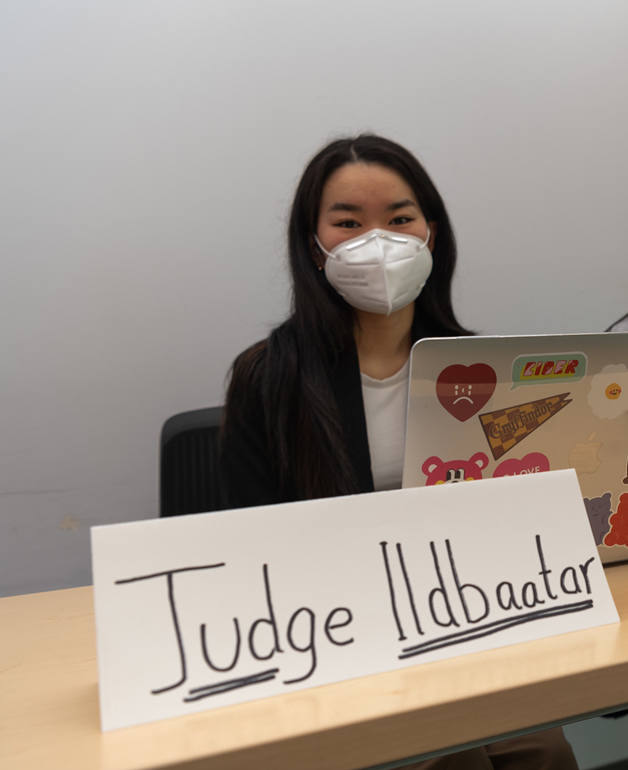
And the jury, comprised of fellow classmates and law society members, agreed. It was a close call, however, with 12 members believing he was guilty while 14 did not.
“I am ecstatic about the verdict and thankful Grubb is a free man,” Matunan. “I am happy he can return home to be with his girlfriend and her children. This was surely a difficult time for them, but again, I’m just glad to report that justice has been restored.”
In addition to the trial of Tony Grubb, the class also worked through a mock trial on March 10 about an assault and battery case and a murder trial on March 15.
“Regardless of whether the defendants are triumphant in each trial, the real winners are, of course, the students,” Doyle said. “Their experience with engaged teamwork, thoughtful analysis and careful preparation has set up fantastic habits for their time in college. They had fun, and they learned more than they probably expected. They had to, to succeed.
“This is something we work toward in the Discovery Core Experience — helping students discover that education at UW Bothell can be exciting, collaborative and very rewarding.”

